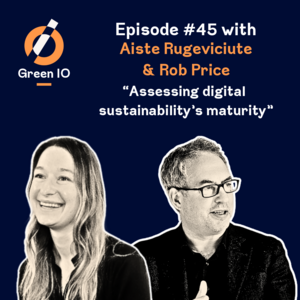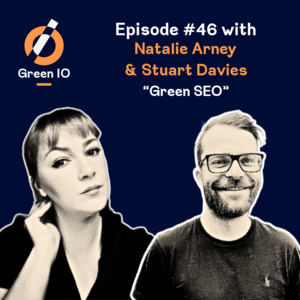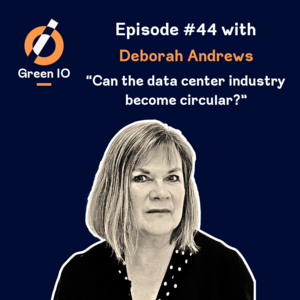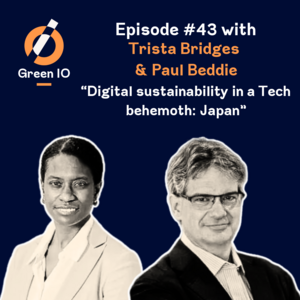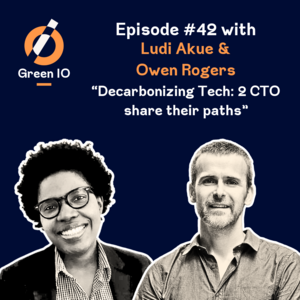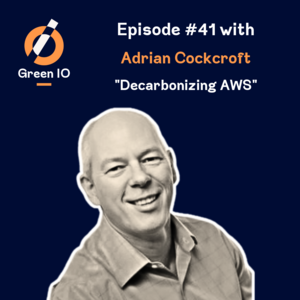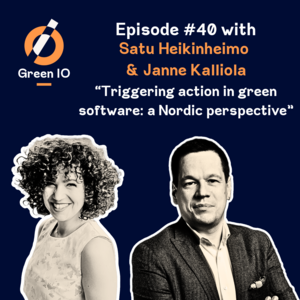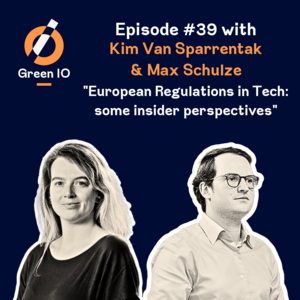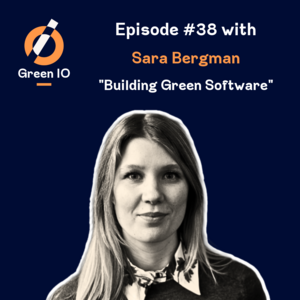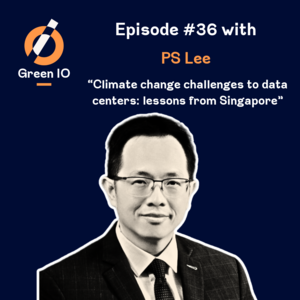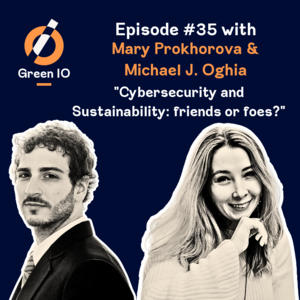#45 - Assessing digital sustainability’s maturity with Aiste Rugeviciute and Rob Price
Update: 2024-09-17
Description
In the early 2020s, companies started facing a big question: how could they be more responsible in the digital world? Could something similar to CSR exist for this virtual and yet highly materialized world? Corporate Digital Responsibility (CDR) was coined to offer some much-needed guidance.
🎙️ To explore its ramification, Gaël DUEZ chats with two renowned experts in CDR: Aiste Rugeviciute, co-author of “B.A.-BA du Numérique Responsable” and now pursuing a PhD in the socio-ecological impacts of CDR strategies, and Rob Price, a key player in developing an international CDR framework. Rob also hosts the “A New Responsibility” podcast, diving deep into CDR's role in business.
Some Takeaways:
🔑 the CDR framework in a nutshell,
🌿 the importance of embracing a balanced approach to CDR in most companies, and
🛠️ a sneak peek to the newly-released CDR maturity model.
❤️ Subscribe, follow, like, ... stay connected the way you want to never miss our episode, every two Tuesday!
📧 Once a month, you get carefully curated news on digital sustainability packed with exclusive Green IO contents, subscribe to the Green IO newsletter here.
📣 Green IO Paris is on December 4th and 5th 2024 --> use the voucher GREENIOVIP to get a free ticket!
Learn more about our guest and connect:
📧 You can also send us an email at contact@greenio.com to share your feedback and suggest future guests or topics.
Aiste and Rob's sources and other references mentioned in this episode:
- CDR Manifesto
- B.A.-BA du Numérique Responsable
- A New Responsibility
- Maturity Model
- Ethos Foundation
- Global action plan for a sustainable planet in the digital age
Transcript
Intro 00:00
To change, we have to think about how organizations or governments incentivize change in an economy and how that helps businesses to do the things that need to be done better.
Gael Duez 00:25
Hello everyone, welcome to Green IO with Gael Duez - that’s me! In this podcast we empower responsible technologists to build a greener digital world, one byte at a time. Twice a month on a Tuesday, our guests from across the globe share insights, tools, and alternative approaches, enabling people within the Tech sector and beyond, to boost Digital Sustainability.
One of my more esteemed peers in Digital Sustainability, and a good friend, who’s now CSO of a large digital tech company used to work before in the garment industry. Sometimes, well quite often, she goes ballistic about the infant level of the digital industry in sustainability compared to other industries. The very idea that digital technology produces products as does the garment industry with clothes and that these products have a footprint both environmental and societal is not that widespread. And when Tech executives become aware of it they often lack the frameworks, the best practices and the metrics to steer the sustainability angle of their company. And answer this pivotal question in an industry, which has just a touch of ego and hubris: how good am I compared with others? And eventually, how good am I with keeping our planet habitable for the human race. Am I being too sarcastic here? Well let’s go back to a more action-drive mindset then.
Since the beginning of the 20’s, a concept has started to emerge embracing these questions and providing some framework for companies with a significant use of digital technology: the idea of their CDR. Full disclosure, I am using this approach with clients when I do consulting gigs so I might be a bit biased. As usual, question and double check everything that is said in this episode. All the references will be put in the show notes on greenio.tech and on your favorite podcast platform. Transparency and Accessibility remain in the DNA of the Green IO podcast. To deep dive in CDR, I have the pleasure to welcome 2 of the best experts we can find on the topic.
Aiste Rugeviciute who graduated in both computer sciences and Sustainable Development and Social Business and has worked for several years on the intersection of Tech and sustainability, she co-wrote the hands-on book "B.A.-BA du Numérique Responsable" in French and she is now doing a PhD on Corporate Digital Responsibility (CDR) strategies and their socio-ecological impacts.
Rob Price is one of the core members of the international group of academics, corporate practitioners and published authors who collaborated in 2021 to aggregate their existing body of work into a single, international definition of the set of principles supporting Corporate Digital Responsibility. He’s also a fellow podcaster with the “A new responsibility” podcast which covered during 5 seasons the use of CDR in companies. He gave a much listened talk to Green IO London last year. And btw this year Aiste will be the one giving a talk on her CDR Maturity Matrix. So make sure to get your tickets for this great gathering of responsible technologists on September 19th.
And without further notice, Welcome Aiste and Rob. Thanks a lot for joining Green IO today.
Rob Price 03:55
Thank you.
Aiste Rugeviciute 03:56
Hi, thanks for having us.
Gael Duez 03:59
You're more than welcome, both of you. I have a terribly complicated question to start. Could you define CDR in two sentences maximum?
Aiste Rugeviciute 04:12
Well, it is a complicated question because there is actually no one definition, at least between the academics. Everybody comes up with their own definitions. But in a nutshell, I would say there are two main ideas. So the first idea is, of course, about responsibility. So what are companies' responsibilities with respect to digitalization, or the way they use digitalization? And the second one is trying to maximize the positive effects of digitalization while reducing the negative ones. So that's kind of the two main ideas combined. Rob, what do you think?
Rob Price 04:57
Well, I mean, it goes back to the introduction, really, doesn't it? So in 2021, that was the question we asked ourselves, and we wanted one sentence that described CDR in the context of all the definitions that the variety of us had created at the time. So, I mean, reading that corporate digital responsibility is a set of practices and behaviors that help an organization use data and digital technologies in ways that are perceived as socially, economically, and environmentally responsible. I think the key thing for us was, at the time, trying to think of something that provided a framework and guidance to help organizations be aware of the consequential impact of the things that they were doing. And no doubt, through the conversation, we'll talk more about finding the right balance in terms of framework versus measurement criteria versus a method, if you like, in terms of organizations doing those things.
Aiste Rugeviciute 05:57
I think also one of the key things, what Rob just said, it's about the perceived value. What's in line with the so-called reference points in the society. That's kind of a key thing when corporations, organizations think in general about their responsibilities, and when it comes to digitalization, aligning with societal social expectations and all the idea, you know, if it's contributing to reducing climate change or any other negative impact, it's all about in line with what right? In line with what expectations and whose expectations. That's where the question of responsibility comes in place.
Rob Price 06:48
And can I build on that very briefly, which is, I'm very conscious of talking about CDR in multiple countries around the world. I think it's very difficult to be really tightly defined, because you have to be conscious that different countries, different political systems, different cultures, there would be pushback if you kind of introduced CDR as a mechanism that you had to follow. Literally. It's important to be conscious of the environment in which you're asking organizations and governments to think about the way in which they operate. Even if they take some of those aspects, that's better than all of those or none of those.
Gael Duez 07:31
So it's really a question of contextualizing the approach, and still we reach some kind of agreement around the world and I guess some principles, some guidelines, as both of you mentioned. Could you maybe elaborate what are the main guidelines, the main items that have reached some sort of consensus that, yes, we should pay attention to this aspect and this aspect and this aspect.
Rob Price 08:02
So, in a sense, the blank sheet of paper th
Comments
Top Podcasts
The Best New Comedy Podcast Right Now – June 2024The Best News Podcast Right Now – June 2024The Best New Business Podcast Right Now – June 2024The Best New Sports Podcast Right Now – June 2024The Best New True Crime Podcast Right Now – June 2024The Best New Joe Rogan Experience Podcast Right Now – June 20The Best New Dan Bongino Show Podcast Right Now – June 20The Best New Mark Levin Podcast – June 2024
In Channel

